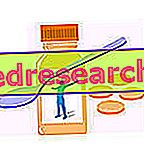Generality
Nausea after eating - also known as post-prandial nausea - is a symptom that occurs in many people.

Nausea after eating can be the consequence of large binges, or it can appear in the presence of certain pathologies affecting the gastrointestinal tract, as well as being a symptom connected to other particular conditions (poisoning, food intolerances, etc.).
The treatment of nausea after eating substantially depends on the cause that triggered it, even if, in some cases, the symptom could also resolve spontaneously.
What is that
What is Nausea after Eaten?
As mentioned, nausea after eating is a symptom (not a disease and not even a condition) that manifests itself with a feeling of malaise generally located at the level of the upper part of the stomach and which can even involve the back of the throat.
The nausea after eating, given the particular moment in which it manifests itself, is generally related to diseases or disorders of the digestive system or food and can occur in individuals of any sex and age (adults, children and the elderly).
Causes
What are the causes of nausea after eating?
The causes of nausea after eating can be multiple, sometimes even pathological in nature.
Fortunately, in many cases, nausea after eating does not result from disease, but may be due to:
- Meals too abundant (the so-called big binges);
- Meals consumed too fast;
- Swallowing air during a meal (a condition that occurs especially when eating too fast).
Often and willingly, all the aforementioned conditions occur simultaneously with a consequent increase in the risk of the onset of the symptom in question.
In other cases, however, the nausea after eating could be connected to diseases of the digestive system of various types, such as, for example:
- Gastroesophageal reflux disease;
- Gastritis;
- Peptic ulcer;
- Hiatal hernia;
- Esophagitis;
- Gastroenteritis;
- Gallbladder stones;
- Infectious diseases (infectious gastroenteritis).
Nausea after eating can also indicate the presence of food allergies or intolerances ; just as it could represent the symptom of food poisoning or poisoning .
The possibility that the symptom may be caused by taking certain types of drugs for which nausea is a known side effect cannot be ruled out either.
Furthermore, nausea after eating is a symptom considered to be very common in pregnant women, in particular, during the first trimester of gestation.
Did you know that ...
The nausea that can occur during pregnancy is not considered pathological, but paraphysiological. This symptom during pregnancy can manifest itself not only after eating, but at any time of the day.
Finally, let us remember that the nausea after eating could be triggered and / or exacerbated also by conditions of anxiety and severe stress. However, it is important to remember that the nausea induced by such disorders could also occur at other times of the day and not necessarily at the end of meals.
Associated symptoms
What symptoms can be manifested in association with nausea after eating?
In the vast majority of cases, nausea after eating is accompanied by an unpleasant sense of vomiting that can sometimes develop into vomiting in all respects, thus leading to the expulsion of stomach contents.
However, the nausea after eating can manifest itself in association also with numerous other symptoms that substantially depend on the triggering cause. Below are some of them.
Abundant and Quickly Eaten Meals
If the nausea after eating occurs after large meals, consumed too quickly and / or characterized by swallowing air, it could be accompanied by sensations of swelling, a feeling of heaviness in the stomach, digestive difficulties and belching.
Poisoning and Gastrointestinal Infectious Diseases
When nausea after eating is caused by food poisoning or infectious diseases of the gastrointestinal tract, it can manifest itself in association with symptoms such as:
- He retched;
- Abdominal cramps;
- Diarrhea;
- Temperature.
Food intolerances and allergies
When the nausea after eating is connected to food intolerances or allergies, it could manifest itself in association with:
- Stomach cramps;
- Diarrhea;
- Abdominal distension;
- Flatulence;
- Abdominal swelling;
- Flatulence.
Gallbladder Calculations
If the nausea after eating is a symptom of the presence of gall bladder stones, it typically occurs in association with vomiting and pain located in the upper right part of the abdomen.
Other Gastrointestinal Disorders
Other symptoms that may occur in association with nausea after eating and induced by non-infectious gastrointestinal diseases (eg gastritis, esophagitis, gastroesophageal reflux disease, etc.) are:
- Stomach ache;
- Acid regurgitation;
- Pain in the mouth of the stomach;
- Heaviness in the stomach;
- heartburn;
- Retrosternal burning;
- Bad digestion.
Please note
The symptoms listed in this chapter are just some of the symptoms caused by the aforementioned pathologies and which may occur in association with nausea after eating. For more information on these diseases, we recommend reading the dedicated articles on this site.
When to worry
When to worry and when to go to the doctor?
Showing nausea after eating is not always an indication of hidden pathologies. It can happen, in fact, for various reasons, to run into a difficult digestion that leads to the development of this symptom.
The nausea after eating should start to worry the patient when it occurs after every meal, or in any case very often, and when it persists for several consecutive days. In such situations, consultation with the doctor is necessary, since the nausea after eating could represent the symptom of some undiagnosed basic disease.
A fortiori, the doctor's intervention is required when the nausea after eating tends to evolve into vomiting and / or if it occurs in association with other symptoms considered "abnormal" for a trivial indigestion.
Care and Treatment
How is Nausea treated after eating?
Being a symptom, the treatment of nausea after eating is completely superimposable to the cure of the cause that caused it.
Non-Pathological Causes
When the nausea after eating is caused by digestive problems of a non-pathological nature, but related, for example, to over-abundant meals, no treatment may be necessary. In fact, the symptom could slowly regress as the digestive processes progress. If this does not happen, it is possible to resort to the use of natural digestives (for example, digestive infusions based on mint and / or licorice). Alternatively, to facilitate digestion, the use of baking soda may also be useful.
As for the treatment of nausea after eating that can occur during gestation, instead, see the dedicated article: Nausea in Gravitaria.
Pathological Causes
In cases where the nausea after eating occurs due to underlying diseases, the treatment to be undertaken must be established by the doctor.
For example, if the nausea after eating is induced by diseases of the gastrointestinal tract characterized by gastric hyperacidity, the doctor may decide to prescribe antacid drugs, proton pump inhibitors or H2 receptor antagonists for histamine .
If, on the other hand, the nausea after eating is caused by bacterial infections, the doctor may consider it necessary to use antibiotics . If, instead, the infection is of a viral nature, the therapy is usually symptomatic and does not require the use of specific drugs.
If the nausea after eating is caused by the presence of gall bladder stones, the treatment should be aimed at their elimination. In this regard, the administration of ursodeoxycholic acid may be useful.
Finally, if the nausea after eating occurs due to food allergies or intolerances, it is necessary to identify - therefore eliminate from the diet - the food or the substance responsible.
Useful Tips
Useful Tips to Prevent Nausea after Eaten
As with the treatment, the prevention of nausea after eating also depends mainly on the cause that caused it.
However, in any case it is a good rule:
- Avoid the big binges;
- Chew slowly and reduce the size of the bites;
- Follow a healthy and balanced diet, preferring foods that are easy to digest;
- Avoid, or at least minimize fatty, fried and / or spicy foods;
- Reduce alcohol consumption;
- Do not lie down immediately after a meal, but wait at least a couple of hours;
- Reduce stress and anxiety.
If the nausea after eating does not resolve following the aforementioned recommendations and even following any therapies prescribed by the doctor, it is good to turn to the latter again who will carry out more detailed investigations and tests.



